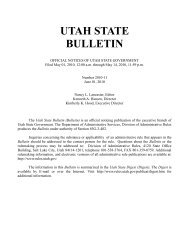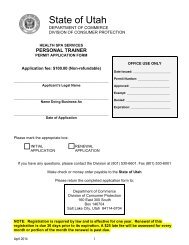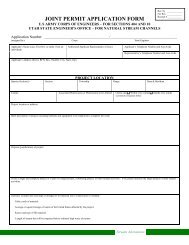Vol. 2007, No. 15 (08/01/2007) PDF - Administrative Rules - Utah.gov
Vol. 2007, No. 15 (08/01/2007) PDF - Administrative Rules - Utah.gov
Vol. 2007, No. 15 (08/01/2007) PDF - Administrative Rules - Utah.gov
Create successful ePaper yourself
Turn your PDF publications into a flip-book with our unique Google optimized e-Paper software.
NOTICES OF PROPOSED RULES DAR File <strong>No</strong>. 3<strong>01</strong>79<br />
KEY: licensing, background screening, fingerprinting<br />
Date of Enactment or Last Substantive Amendment: [<strong>No</strong>vember<br />
16, 2005]<strong>2007</strong><br />
Authorizing, and Implemented or Interpreted Law: 62A-2-1<strong>08</strong> et<br />
seq.<br />
<br />
Human Services, Administration,<br />
<strong>Administrative</strong> Services, Licensing<br />
R5<strong>01</strong>-19<br />
Residential Treatment Programs<br />
NOTICE OF PROPOSED RULE<br />
(Repeal and Reenact)<br />
DAR FILE NO.: 3<strong>01</strong>79<br />
FILED: 07/11/<strong>2007</strong>, 09:12<br />
RULE ANALYSIS<br />
PURPOSE OF THE RULE OR REASON FOR THE CHANGE: Changes to<br />
this rule are necessary to address requirements set forth in<br />
Subsection 62A-2-1<strong>08</strong>.2(1)(a), which requires that the Office<br />
of Licensing make rules that establish categories of<br />
Residential Treatment licenses based on the differences in the<br />
types of Residential Treatment programs. It also provides<br />
more clarity to those rules that are generally the same as ones<br />
currently in effect.<br />
SUMMARY OF THE RULE OR CHANGE: This rule facilitates<br />
substantive changes by establishing the following sections,<br />
which did not previously exist in the repealed rule: Definitions;<br />
Legal Requirements; Staff Requirements; and, Documentation<br />
Requirements. It also creates definitions and new categories<br />
for Residential Treatment Group, Residential Treatment<br />
Facility, Residential Treatment Center, Residential Treatment<br />
Campus, and a category for programs serving clients that<br />
offend sexually or violently. Although there are few other<br />
minor changes within this rule, most of the facility<br />
requirements, health and safety regulations, record keeping,<br />
and client services requirements are basically the same as<br />
those found in the previous rule.<br />
STATE STATUTORY OR CONSTITUTIONAL AUTHORIZATION FOR THIS<br />
RULE: Sections 62A-2-106 and 62A-2-1<strong>08</strong>.2<br />
ANTICIPATED COST OR SAVINGS TO:<br />
THE STATE BUDGET: It is anticipated that there will be some<br />
initial implementation costs associated to this rule in the way<br />
of development and printing of new check lists, and training of<br />
staff to the new rule, but all of these costs can be absorbed in<br />
current budgets.<br />
LOCAL GOVERNMENTS: There should be no direct costs to<br />
local <strong>gov</strong>ernments because they do not operate programs that<br />
are regulated by this rule.<br />
OTHER PERSONS: There should be no costs to other<br />
persons except for those listed below in "compliance costs for<br />
affected persons" and "comments by the department head".<br />
<br />
COMPLIANCE COSTS FOR AFFECTED PERSONS: Human service<br />
programs that are required to be licensed for Residential<br />
Treatment will experience some minimal administrative costs<br />
to modify or update policies and procedures manuals and<br />
record keeping procedures. There are both costs and savings<br />
anticipated in regard to the staffing requirements. Depending<br />
on the program it is possible to have some moderate cost<br />
increase as a result of staffing and training requirements.<br />
COMMENTS BY THE DEPARTMENT HEAD ON THE FISCAL IMPACT THE<br />
RULE MAY HAVE ON BUSINESSES: The businesses that may<br />
experience some mild to moderate fiscal impact as a result of<br />
these rules are the human services programs that will be<br />
licensed to provide residential treatment services. Some of<br />
these business receive public funds through contracts with the<br />
department, and will be evaluated for fiscal impact through the<br />
rate setting process. Private noncontracted Residential<br />
Treatment programs may need to set higher fees to offset any<br />
additional costs due to these regulations.<br />
THE FULL TEXT OF THIS RULE MAY BE INSPECTED, DURING REGULAR<br />
BUSINESS HOURS, AT:<br />
HUMAN SERVICES<br />
ADMINISTRATION, ADMINISTRATIVE SERVICES,<br />
LICENSING<br />
120 N 200 W<br />
SALT LAKE CITY UT 84103-<strong>15</strong>00, or<br />
at the Division of <strong>Administrative</strong> <strong>Rules</strong>.<br />
DIRECT QUESTIONS REGARDING THIS RULE TO:<br />
Ken Stettler at the above address, by phone at 8<strong>01</strong>-538-4235,<br />
by FAX at 8<strong>01</strong>-538-4553, or by Internet E-mail at<br />
kstettler@utah.<strong>gov</strong><br />
INTERESTED PERSONS MAY PRESENT THEIR VIEWS ON THIS RULE BY<br />
SUBMITTING WRITTEN COMMENTS TO THE ADDRESS ABOVE NO LATER<br />
THAN 5:00 PM on <strong>08</strong>/31/<strong>2007</strong>.<br />
THIS RULE MAY BECOME EFFECTIVE ON: 09/07/<strong>2007</strong><br />
AUTHORIZED BY: Ken Stettler, Director<br />
R5<strong>01</strong>. Human Services, Administration, <strong>Administrative</strong><br />
Services, Licensing.<br />
R5<strong>01</strong>-19. Residential Treatment Programs.<br />
[R5<strong>01</strong>-19-1. Authority.<br />
Pursuant to Section 62A-2-1<strong>01</strong> et seq., the Office of Licensing<br />
shall license residential treatment programs according to the<br />
following rules.<br />
R5<strong>01</strong>-19-2. Purpose.<br />
Residential treatment programs offer room and board and<br />
provides for or arranges for the provision of specialized treatment,<br />
rehabilitation or habilitation services for persons with emotional,<br />
psychological, developmental, or behavioral dysfunctions,<br />
impairments, or chemical dependencies. In residential treatment<br />
programs, consumers are assisted in acquiring the social and<br />
behavioral skills necessary for living independently in the<br />
community in accordance with Subsection 62A-2-1<strong>01</strong>(<strong>15</strong>).<br />
48 UTAH STATE BULLETIN, August 1, <strong>2007</strong>, <strong>Vol</strong>. <strong>2007</strong>, <strong>No</strong>. <strong>15</strong>


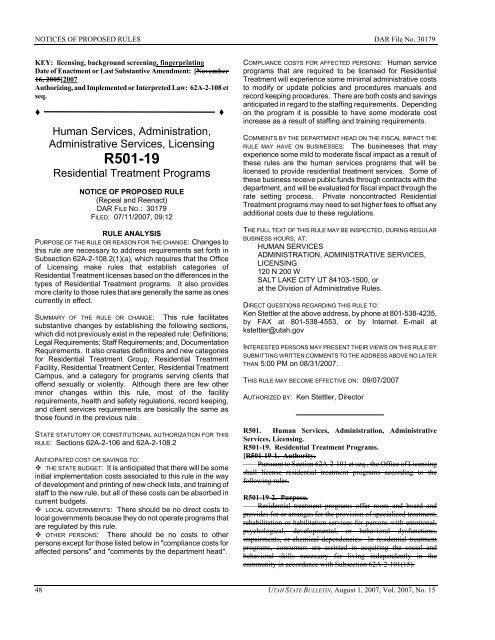


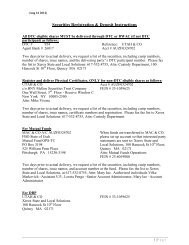
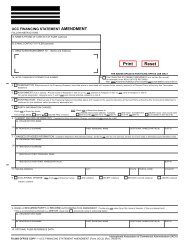
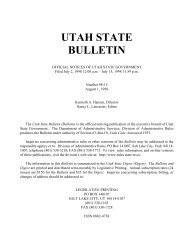
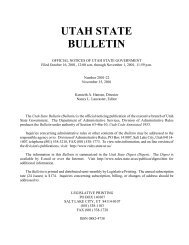


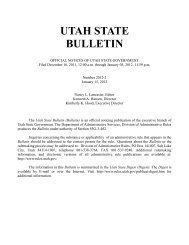
![Lynx avoidance [PDF] - Wisconsin Department of Natural Resources](https://img.yumpu.com/41279089/1/159x260/lynx-avoidance-pdf-wisconsin-department-of-natural-resources.jpg?quality=85)
